The Side of Denis Johnson You Never Knew
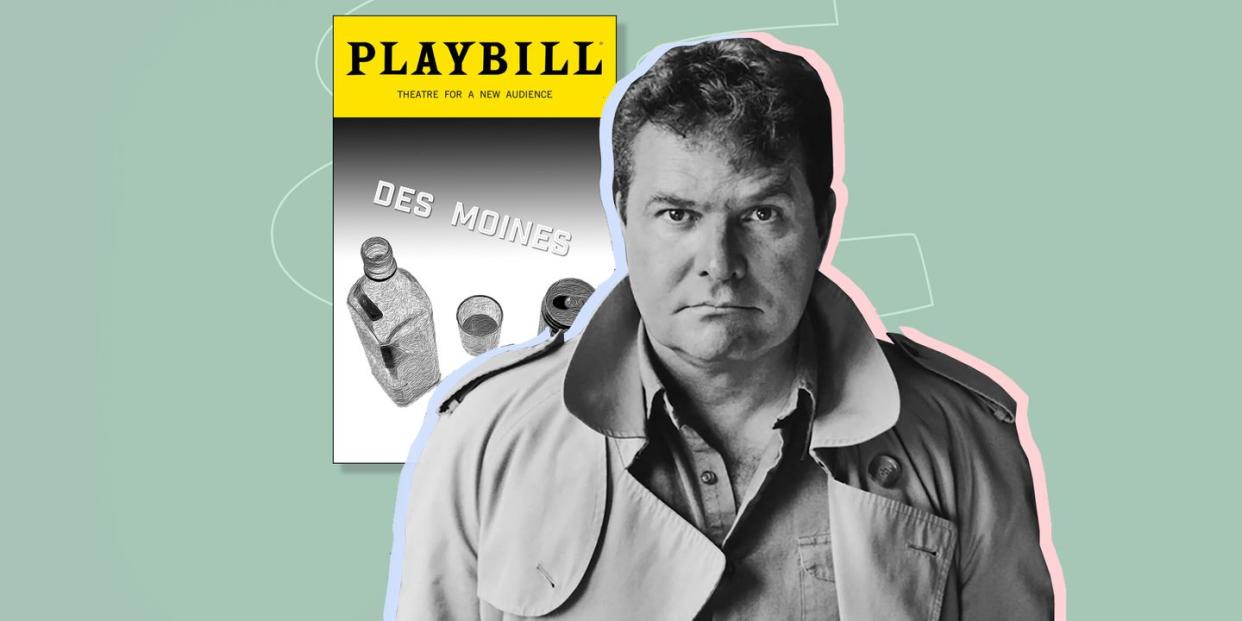
- Oops!Something went wrong.Please try again later.
- Oops!Something went wrong.Please try again later.
- Oops!Something went wrong.Please try again later.
Reality is unreal, and the unreal is reality. The late Denis Johnson, who died five years ago, seems to have viewed the world this way, and embodies that paradox in nearly all of his work—his poetry, his fiction, his nonfiction, and his plays. Again and again, in genre after genre, he portrays the astonishment, both sacramental and horrendous, of being alive and conscious in an inexplicable universe. His characters aren’t sure why they’re here, where they’re going, and what the ultimate point is of whatever it is that they’re doing (aside from making enough money to afford a drink or two). “What I write about,” Denis has often been quoted from an interview in New York Magazine, “is the dilemma of living in a fallen world, and asking why it is like this if there is supposed to be a God.”
There’s no more vivid, comic, tragic, and mesmerizing theatrical version of this fallen world than his final play Des Moines, now premiering in Brooklyn at the Polonsky Shakespeare Center, produced by The Theater for a New Audience, founded by Jeffrey Horowitz in 1979. One of the characters, Father Michael, a hard-drinking priest who likes to accentuate his face with lipstick, eye shadow, and rouge, speaks a few lines, not unlike what Denis once spoke to me back when I was his editor at Esquire many years ago and we were talking at an Italian restaurant about the possibility of an afterlife. He chuckled a little bit, sipped his Coke, and then told me he thought death was on both sides of life, and that life seemed to be just a brief interruption. Father Michael says something very similar: “I find myself mourning the eternity of my death. Not the death to come, but the death I was before I lived.” Despite his Catholicism, Father Michael refuses to make a comforting prediction about one of the character’s coming demise. He states: “I’m saying the mystery of death, of the sudden prospect of death, well… there’s very little you can say. But… ” And then he says nothing more. He sees the reality of the Bible as a myth, and the reality of life as an enormous discrepancy from that myth.
The five characters of Des Moines—Dan, a taxi driver, and Marta, his cancer-stricken wife (played by Arliss Howard and Johanna Day); Jimmy, their wheelchair-bound granddaughter, who until recently has been their grandson (Hari Nef); Mrs. Drinkwater, a Black woman whose husband has just died in a plane crash (Heather Alicia Simms); and Father Michael, the priest with make-up (Michael Shannon)—all gather in late October early in the evening at a second-floor apartment on the former edge of Des Moines, Iowa, where they indulge in a loving, albeit nearly incoherent collaboration, in part to address the past and coming deaths of loved ones. Together, they drink multiple “depth charger” cocktails, sing karaoke, thump the kitchen table, stand atop chairs, fall down on the floor, and ask unanswerable questions that are often answered only by silence and songs. They can’t always tell the difference between their dreams and their lives.
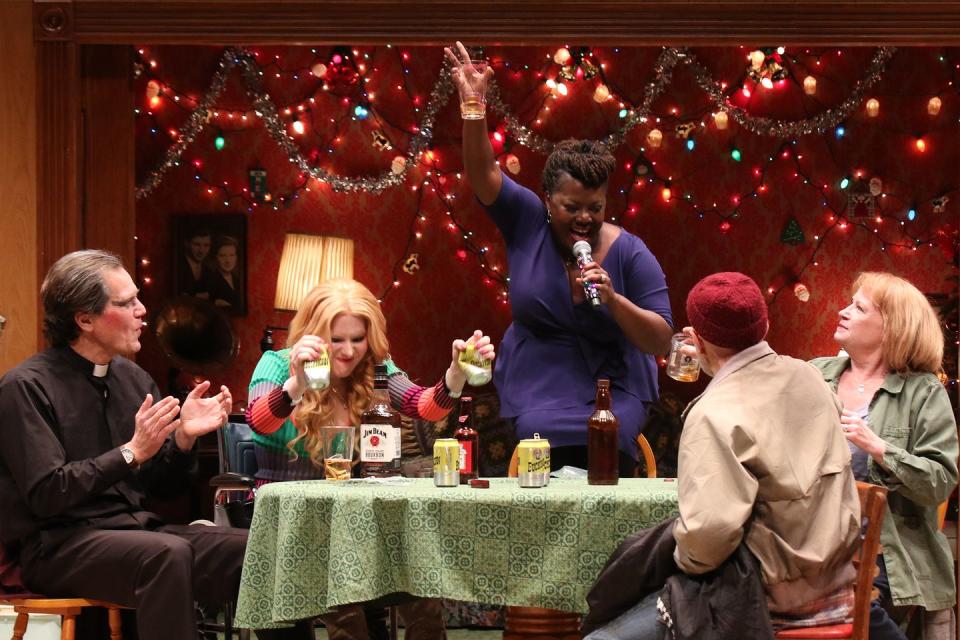
Would that Denis might, in some form or fashion, return to New York and his interruption of death, settle into a seat in the theater, and stare at this galvanizing version of his last play. His widow, Cindy Johnson, recently told me that her recollection was that her husband had actually started writing plays as early as 1991 after he watched Holly Hunter and Arliss Howard stage a scene from his novel Resuscitation of a Hanged Man. “When Denis returned home,” she said, “he was a changed man, utterly smitten by the live performance of his writing. He devoted himself to playwriting ever after, but never got to see his work triumph. He always believed it would happen, but he predicted it would be long after he was gone. Alas.”
Alas, indeed. It’s true that Des Moines hasn’t come to fruition until after his death, as he predicted. Many of his admirers, including me, had initially considered his playwriting a temporary diversion, a hobby, a distraction from his real work as a poet, fiction writer, and unorthodox journalist. A New York Times theater critic went so far as to condemn Denis in 2002 for “having wandered into the wrong genre” with his play Shoppers Carried by Escalators Into the Flames. I attended several readings of his scripts in the first decade of the 2000s, including Des Moines at the Flea Theater in New York in 2008, and while I enjoyed the gatherings, I wasn’t sure about the nature of the plays. Staged readings lack the visuality of a set and the thrumming reality of humans physically interacting with each other in a confined space.
But nothing deterred Denis from playwriting. “All I want to do is write plays,” he had told me back in 2000 (though, in fact, he was also composing the brilliant novella Train Dreams and the 2007 National Book Award winning novel Tree of Smoke). Plays were easier to write than novels, he confessed with a laugh. He loved hearing his own sentences expressed aloud by others, rather than simply listening to them in his own head. Fiction writing can be a solitary, even solipsistic endeavor, as isolated as being locked into a closet for years. Theater offers a life together rather than a life alone.
His seemingly newborn enthusiasm for the theater motivated me as a friend and editor to connect him through the film director Michael Almereyda to the rehearsal of Sam Shepard’s play The Late Henry Moss, which was taking place in San Francisco in the fall of 2000. (Almereyda filmed a documentary of the rehearsal entitled This So-Called Disaster.) Denis’s curiosity about interaction between script, director and actors was enormous. The cast included Sean Penn, Nick Nolte, and Woody Harrelson, among others. Shepard was at ease with Denis studying the rehearsal and taking notes, but according to Denis, some of the actors were not. Given that soldiers in countries such as Liberia, Iraq and Afghanistan (in Kabul, Denis frequently smiled at the fighters pointing guns at him) had tended to view Denis’s reportorial presence as peaceful, and sometimes even entertaining, the actors’ nervousness about his witnessing their practice struck me as unduly anxious. Regardless, Denis was forced to leave the rehearsal. Which irked the hell out of him. He told me that as a writer, he considered himself on the same artistic level as Shepard and his actors, and that he ought to have been treated more respectfully as a colleague.
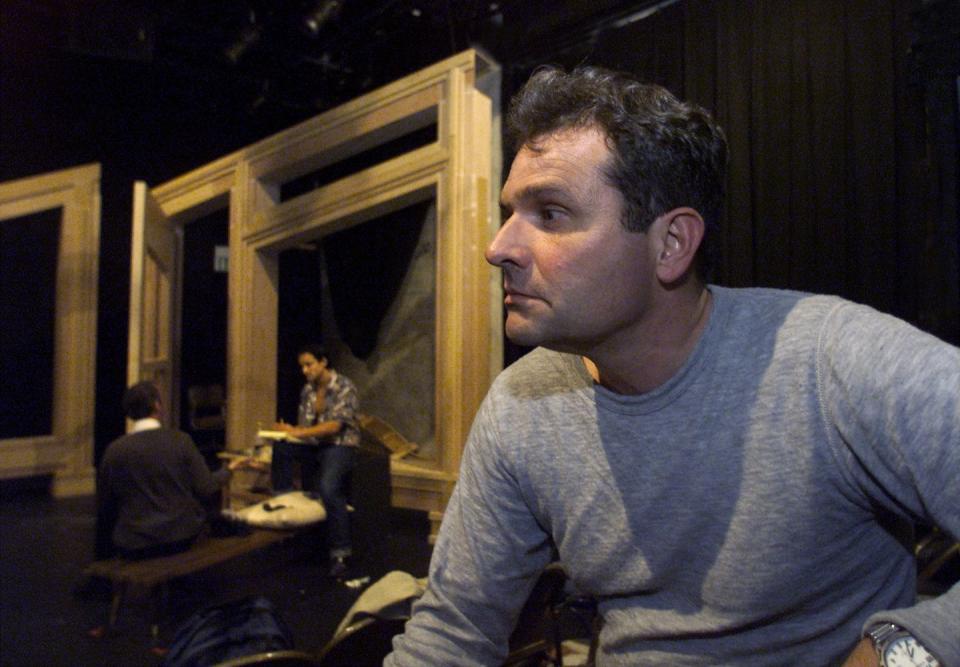
Nonetheless, he kept on writing plays, including two remarkable dramas in blank verse, Soul of a Whore and Purvis, both of which were performed at the Campo Santo Theater Company in San Francisco, where Denis was designated playwright-in-residence from 2000 to 2010. He likely first drafted Des Moines before 2007. I witnessed a stage reading of it in 2008 at the Flea Theater in New York.
Around that time, the actor and playwright Wallace Shawn and his partner, the writer Deborah Eisenberg, sang the praise of Denis’s literature to Jeffrey Horowitz, who recently told me “Wally wrote me an email—I still have it—that as far as he was concerned, Denis was one of the great American writers, and that if we were smart, we’d get Denis attached to the theater.”
Horowitz went to a reading of Johnson’s. It mystified and delighted him. “With great art, you don’t always get it!” he exclaimed. “I had to dig at it. It’s like archaeology—you’re searching! I’ve always been attracted to art that you don’t know what it means, but you want to know what it means. Art that is mysterious, like a person.”
He started a workshop for Des Moines in 2015, two years before Denis died. “I think he knew he was sick,” Horowitz said. “He may have been counting his days, though I don’t know that for sure.” Horowitz has never been a fan of didacticism, which is one reason he admires Des Moines. “There’s a coherent incoherence in the play because modern life is incoherent,” he said. “People are adrift and this country is adrift. Denis is saying we don’t really know who we are. One of the big themes of his play is ‘wake up!’” Indeed, one of the most startling exchanges in the play is when Father Michael yells into Dan’s ear: “DAN WAKE UP YOU’RE DREAMING DAN.”
Despite Horowitz’s affection for the play’s unconventionality, he asked Denis to revise the script near the end of the workshop. Denis, eager to see his play produced, agreed to make some changes. “Great, let’s do it,” he said. A week or so later, however, he returned to tell Horowitz that he had decided not to revise his play after all. “Denis’s last words to me were, ‘No, it’s perfect as it is,” Horowitz said. “I find it compelling that he said that. The little I knew Denis, he didn’t advertise or proselytize himself. Nothing pretentious about him.”
Horowitz explained that Arin Arbus, the director of Des Moines who also supervised the 2015 workshop, tended to agree with Denis from the start. “Arin was much more sure that this was an important work,” he said. “During the pandemic, the play she said she most wanted to do was Des Moines.”
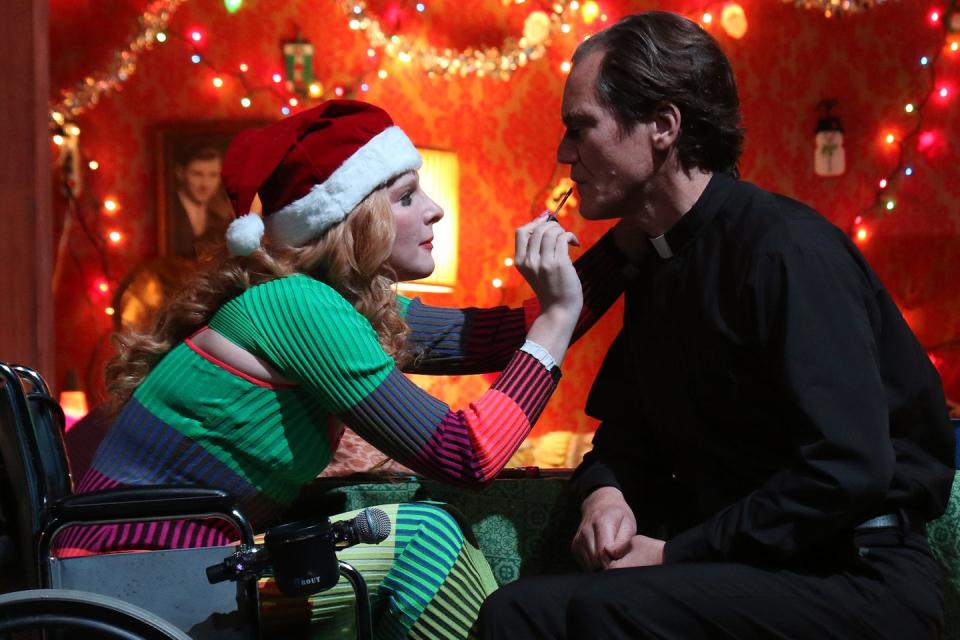
Arbus, an accomplished and imaginative director of Shakespeare dramas, had also spent many years directing plays in a men’s prison in upstate New York, an endeavor about which she declared, “theater is often most meaningful in communities which have a profound and urgent need to make sense of an incomprehensible world.” Similarly, I think it’s fair to say that the our current nation is strangely a rather large, prison-like community that often feels an inmate equivalency with an urgent need to understand the present incomprehensibility of this country.
“Jeffrey was initially both taken by the play and baffled by it,” Arbus said. “He shared it with with me. I was immediately thrilled. I had to read it several times and I didn’t understand it. But there was so much in it that was penetrating and theatrical that I knew I wanted to understand it.”
When Denis arrived at the workshop in 2015, she asked him question after question. What was the lay-out of the apartment? Did Marta work? Did Father Michael feel like he was damned? “There was nothing he hadn’t thought about in regard to this,” Arbus said. “In the workshop, when we did the second scene, where Father Michael told Mrs. Drinkwater, ‘I just got married to your husband,' Denis told me, ‘I can feel for you and I can’t help you.’ He laughed. ‘You can’t tell the audience it was a dream.’ He was objecting to my craving for a clarity that would have killed something. I believe he had a vivid vision of a theatrical event. Is that reasonable? My answer is that it’s visionary.”
Arbus said that the actor Michael Shannon has told her that he feels Denis was trying to “break something.” “I agree,” Arbus said. “It’s all quite kitchen-sinking. Denis keeps setting up the audience to expect something, then shatters those expectations.”
She feels that Des Moines is “a very significant American play.” “Crazy that it’s only been produced once,” Arbus said. “Des Moines embodies a national mentality. Is there a place more American than Iowa? Here are five struggling people, very much alone. And they have strong opinions and judgements of each other. I don’t know their political views, but they are divergent. And yet, they come together in this crazy, beautiful ritual which is a kind of communion which has all the elements of church. Each can express things they’ve never shared before. And they are heard and seen and honored in a drunken way. Then life goes on. Since Denis died, this country is even more divisive. A lot of what we deal with now is in the play.”
Having spent a couple of hours at a Times Square rehearsal of Des Moines, watching such intricate and repetitive issues as Hari Nef wondering where to pivot in the wheelchair, Arliss Howard trying to figure out exactly when to put lipstick on his lips, and Johanna Day attempting to prevent herself from getting lightheaded from all the booming she must do—so many essential details to address—I was stunned when I finally saw the play’s full-length performance at the Theater for a New Audience. “Should I boom here?” Day had asked Arbus in the rehearsal. Her booming in the the Brooklyn theater was musically perfect, lightheaded or not.
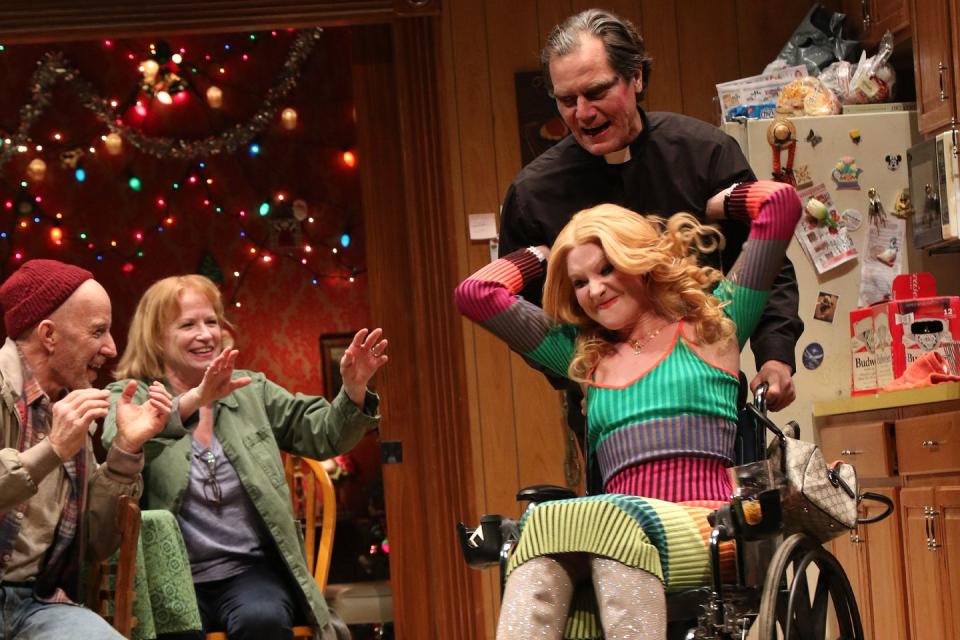
One of the play’s greatest distinctions, at least for me, is that it feels less like a narrative and more like life, like watching an actual party. Sometimes the best plays don’t come across as plays. Narratives, especially traditional ones, can sometimes seem unrelated to actual life. Life is not a story. As a theater-goer at Des Moines, I felt like I had sagged onto a couch in that same second-floor flat, surrounded by despairing, joyous and drunken friends of a single night, spying on their wild, impromptu get-together that came about as spontaneously as a plane crash. There was chaos, unpredictability, pain, pleasure, and kindness.
What Denis loved about theater—its communalism—is what I suspect he also loved (as I do) about the true virtue of religious practice. It’s not about getting answers to unanswerable questions so much as asking questions together with fellow humans. Hearing and seeing each other speak. Hearing and seeing each other cry. Hearing and seeing each other laugh and sing and maybe spit out shot glasses from depth charger cocktails. Are there any obvious answers to the eternal questions of living and dying? No. As Jimmy asserts to Father Michael in Des Moines, “Teachers don’t understand what they’re teaching… priests are liars… also… God doesn’t really know what he’s doing.” But as Denis’s play demonstrates, there are gatherings that shine a light on their gatherers through the gathering alone. It’s like a novel church service with innovative rituals of drinking, singing, and sleeping together, all in the same place on the same night. And in the morning, when it’s time to go back to a regular day, there’s sipping plenty of coffee with a bit of non-dairy creamer.
You Might Also Like

